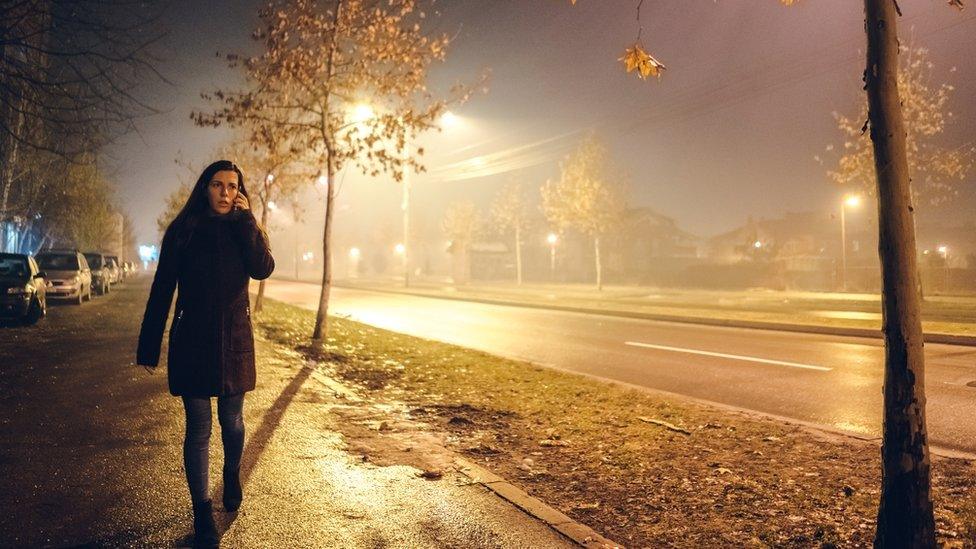ÔÇİHi, thanks for calling. Are you OK? How far away are you?ÔÇÖ
- Published

Women's safety is once again in the spotlight - and walking home at night is often when their fears are most acute. Now a telephone helpline called Strut Safe, launched in Edinburgh last year, is keeping people company when they walk home alone.
Alice Jackson still remembers the night she answered that call.
"When you pick up the phone you can always tell if the person is scared," she says. "It's the way their voice shakes or catches."
The caller told Alice that she was on her way home.
"She was so sure that something was going to happen, she was preparing herself, she was running.
"She said, 'I think someone is following me.'"
The girl gave Alice her name, her age, her birthday, her address, and a full description of what she looked like and every item of clothing that she was wearing.
"She was like, 'That's what you're going to need,'" Alice says.
"I can still remember exactly what she said she was wearing."
Alice, 22, and her friend Rachel Chung came up with the idea of a telephone helpline that people can call if they're walking home alone at night in April 2021.
It wasn't long after they had attended a vigil for Sarah Everard.
"We were devastated and angry," Alice says, "so we bought a cheap burner phone, asked people to volunteer to answer it, and posted the number in community groups."
Strut Safe has been taking calls every weekend since.
"They might have left their friends back at the club, their boyfriend isn't picking up, or it's just too late to call their mum," Alice says, "so people can stay on the phone with one of our volunteers while they're walking home."
The Strut Safe volunteers who answer calls are each interviewed, trained and background-checked. They're there to chat and to provide reassurance, but sometimes callers are distressed and worried for their own safety.
"They're in tears, really upset, and you're coaching them through it," Alice says.
"You'll say, 'Look, I'm here with you.'"
And volunteers like Alice are ready to alert the police or call an ambulance if needs be.
"But we'll always ask, 'Are you happy for us to use this information to help you if something goes wrong?'" she says.
In Night Watch, produced by Caitlin Smith for 91╚╚▒¼ Radio 4, four women from different parts of Britain share stories of street harassment - you can listen again here
Initially people heard about Strut Safe through word of mouth, now most people find and share their number on social media. And the volume of calls they receive each weekend varies, Alice says.
There was a massive spike after the death of Sabina Nessa in September last year, she says, and following the murder of Ashling Murphy last week she anticipates that they will see another increase in calls.
"When these things happen people feel more unsafe," she says.
Answering the phones for Strut Safe has really opened Alice's eyes to the extent of street harassment and violence, she says.
"People who deny that this is an issue, who say that people make this up for attention, that these things don't really happen, or that the streets aren't like this - listening in on these calls, there is no denying it."
Funded by donations, Strut Safe operates on a shoestring, and Alice acknowledges it's not a solution.
"To people who say Strut Safe is just a sticking plaster, we understand that - we can't solve the issues," she says.
"But something exists now that didn't exist before, we are here for anyone who needs us, and more change will hopefully come."
Every time a caller gets home safely it's a relief, Alice says.
"They'll say, 'I can see my house now,' or, 'I'm only a minute away,' but I always say, 'Don't worry, it's OK, I'll stay on the phone.
"Just let me know when you're in the door.'"
She'll hear the clatter of keys, someone's mum calling, "Where have you been?" or a dog bark.
And then the words, "That's me here now, thank you so much".
"Sometimes you come off a 20-minute call that's been really emotionally intense, really serious. The caller might have been running at the end, crying. And then you'll hang up, and you're sitting on your sofa, the telly paused, and there'll be silence," Alice says.
And then the phone will ring again.
"Hi, I'm just on the way home from my work night out. I wanted to call someone and my friend gave me this number."
"And you just find your flow again," she says.
"Hi, thank you for calling. Are you alright? How far away are you?"
's free helpline 0333 335 0026 operates from 7pm-3am on Fridays and Saturdays, and 7pm-1am on Sundays
You may also be interested in:
Watch: Can this app help to keep women safe on the streets?